June 2020
This newsletter has been created by Wayne RESA literacy consultants for literacy educators. In each issue, you will find Literacy Learning Network updates and information, statewide initiative updates, book synopses, teaching and coaching strategies, and upcoming professional learning opportunities. We look forward to partnering with you as we engage in best practices in literacy instruction for all students.
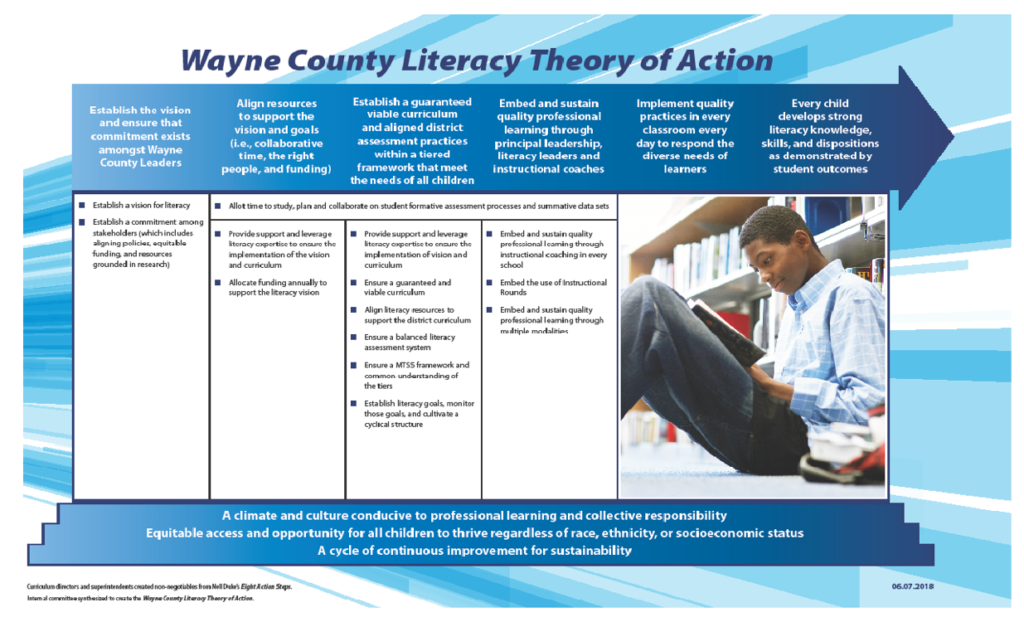
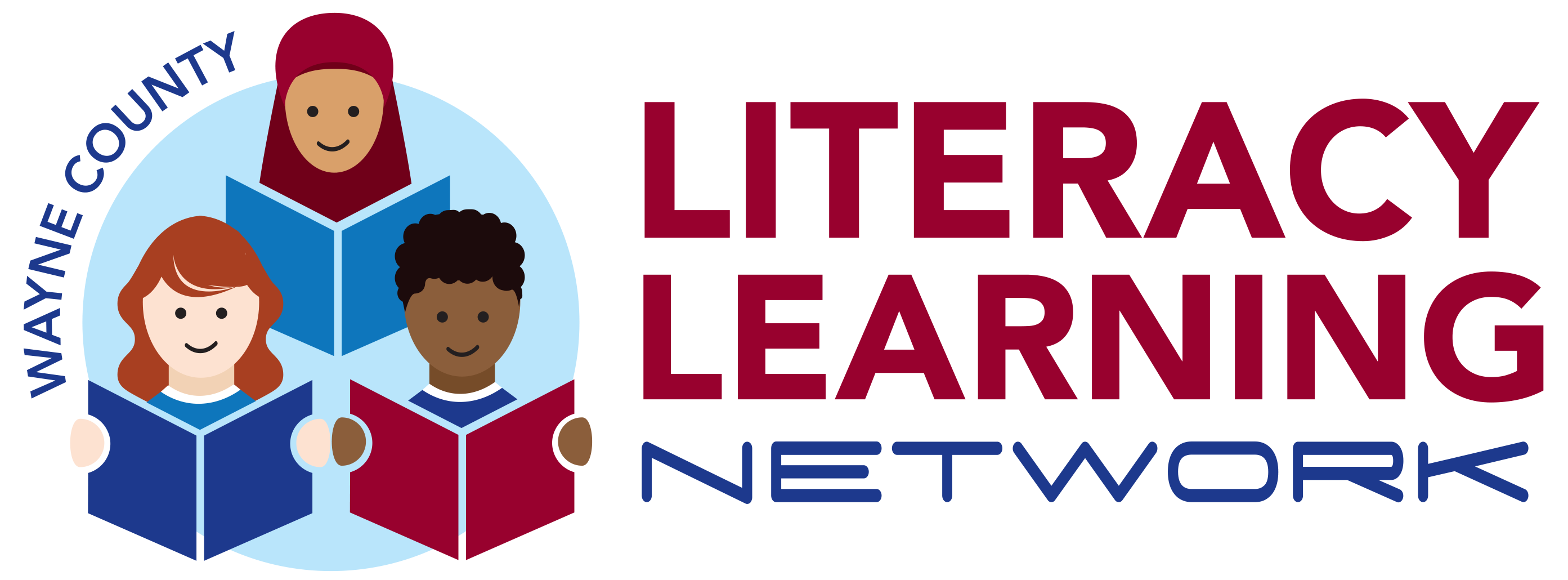
Updates
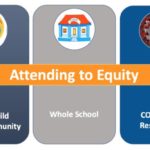
Continuity of Learning: Resources that Prioritize Equity and the Whole Child
Since early March, a team of Wayne RESA consultants representing different areas of expertise have worked to modifiy and update what began as a remote learning toolkit. The current resource provides Remote Learning Guidance for Districts, Schools, Educators and Families. To further support district leaders and educators when using the site, Wayne RESA has created a guidance document. Disparities in access and opportunity for students, especially those in underserved populations, have become even more pronounced as COVID-19 forced students out of their classrooms, many with little to no access to their teachers or materials. Wayne RESAs commitment to ensuring equitable opportunities for all students includes remote learning environments. To that end, this site, which is continually updated, provides guidelines for equity-based remote learning plans, considers the important intersections between students, schools, families, and communities, and strives to present research-based best practices for instruction in synchronous and asynchronous learning platforms.
COSA Initiative: Coaches on Special Assignment

The provisions of the Early Literacy Coaching Grant 35a(4) have dramatically increased the number of literacy coaches throughout the state for the 2020-2021 school year. Since the announcement of these allocated funds, Wayne RESA had worked side by side with districts by providing a cohesive county-wide plan that includes ongoing professional development. To kick off that effort, the Coaches on Special Assignment (COSAs) will attend virtual training in July that combines asynchronous and synchronous learning. These sessions will introduce COSAs to their roles and responsibilities and will acclimate them to the MAISA GELN ELTF Essential Coaching Practices for Elementary Literacy and the MAISA GELN ELTF Essential Instructional Practices in Early Literacy: Grades K-3. Professional learning will continue throughout the school year as the COSAs attend the COSA Collaborative and the Wayne County Coaching Network sessions. These sustained opportunities for deep learning and collaborative inquiry will better equip literacy coaches to guide K-3 teachers in research-based instructional practices aimed at increasing the literacy skills of our youngest students.
Statewide Updates
| In response to the temporary suspension of in-person learning and Executive Order 2020-35 (COVID-19), the Michigan Department of Education has established a link to a new document: Supporting Summer Learning: Pandemic or Not (May 2020). This document includes guidance and resources to support K-12 students in such literacy realms as transitioning to summer learning and accessing literacy enrichment activities in order to continue to build upon skills that will aid in literacy development. To further support literacy learning and to limit summer learning loss, a Remote Learning Resources tab has been added to the LiteracyEssentials.org website. The Early Literacy Task Force has compiled resources to aid in learning at a distance. The resources include guidance videos on conducting small group literacy lessons from a distance: Remote Learning Resources and Videos with Dr. Nell Duke. A guide titled Summer Reading Engagement: High Impact/Low Effort Solutions Already Being Used Across Michigan is also available. |
| In partnership with Michigan Virtual and EduPaths, all educators in Michigan have free access to the suite of online modules featuring in-depth study of the MAISA GELN Essential Practices. The modules offer online training for PreK-Grade 3 teachers, Administrators, and Literacy Coaches and will provide all stakeholders with a strong basis of research-supported content knowledge in literacy within the role(s) they serve. An overview of the module content can be found in the Guide to Michigan’s FREE Online Professional Learning Materials on Research-Supported Practices in Literacy. When used as intended, in ongoing professional learning within a district system, the modules’ content presentations, videos, and supporting documents create an environment to foster and promote personal reflection, discussion, and planning in response to new learning. The WRESA Literacy Consultants are readily available to provide side-by-side support to district and building-level teams seeking to engage in the modules, serving as facilitators, co-facilitators, or simply thought-partners on how best to initiate the learning opportunity. Additionally, the WRESA Department of Literacy is developing virtual learning opportunities especially for Wayne County coaches, educators, and leaders to further engage around how the Essential practices apply in our current reality of virtual teaching, learning, and connecting. Please contact Mellissa Wilson (734-334-1459) with any questions. |
| Registration is now open for the MDE Fall 2020 Virtual Continuous Improvement Conference which will be held on October 20 from 7:30 a.m. to 3:30 p.m. Registration is $125 per participant and includes SCECH credit. Registration will allow the registered participant access to the conference sessions for three weeks following the event. Learn more, register for the conference, see the agenda and/or submit an RFP. |
| The summer Kindergarten Readiness Assessment (KRA) Training-of-Trainers and Data Managers will be provided in a virtual format. Districts will need to select district trainers and data managers to register and attend the summer virtual training. The trainers will provide training to teachers back in the district prior to the administration of KRA. Click here to register for summer training. For more information contact Heather Rottermond at rotterh@resa.net. |
The 6-12 Disciplinary Literacy Task Force is proud to announce two learning opportunities for secondary English, Mathematics, Science and Social Studies teachers, as well as building leaders, instructional coaches, and educators at higher education institutions. These opportunities have been designed with flexibility and relevancy in mind. Introduction to the Essential Practices will be delivered virtually on August 4 from 8:30 am to 12:00 pm. The Disciplinary Literacy Deeper Dive Institute will combine synchronous and asynchronous learning opportunities starting in October 2020. |
Books and Strategies
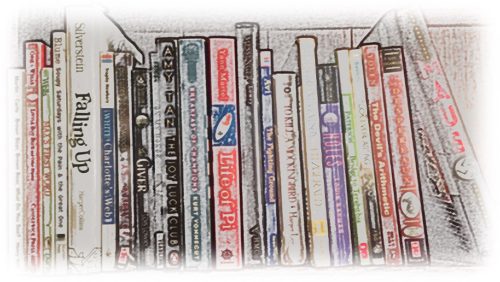
Book Talk
Igniting Passion in Readers of All Ages
A Boy Like You
Frank Murphy & Kayla Harren
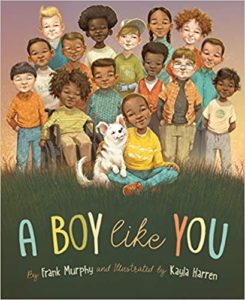 Kayla Harren’s detailed illustrations beautifully support Frank Murphy’s message about being unique: “But you are the only you there is!” Cultivating kindness, bravery, and wisdom are essential, but the narrator explains the importance of hobbies, interests, and talents, too. In pursuing these, the narrator reiterates: “the world needs a boy…a smart boy, a brave boy, a kind boy…a boy like you!”
Kayla Harren’s detailed illustrations beautifully support Frank Murphy’s message about being unique: “But you are the only you there is!” Cultivating kindness, bravery, and wisdom are essential, but the narrator explains the importance of hobbies, interests, and talents, too. In pursuing these, the narrator reiterates: “the world needs a boy…a smart boy, a brave boy, a kind boy…a boy like you!”
The List of Things That Will Not Change
Rebecca Stead
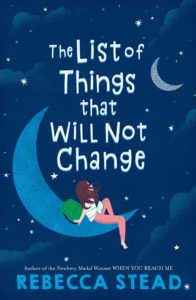 When Bea’s parents tell her that they are going to get a divorce, they give her a journal. The first page is “the list of things that will not change,” and their love for Bea is at the top of the list. When Bea’s dad tells her that he is going to marry his boyfriend, she is absolutely thrilled because she will finally have a sister. As the wedding preparations progress, Bea learns an important lesson about intolerance and the power of love.
When Bea’s parents tell her that they are going to get a divorce, they give her a journal. The first page is “the list of things that will not change,” and their love for Bea is at the top of the list. When Bea’s dad tells her that he is going to marry his boyfriend, she is absolutely thrilled because she will finally have a sister. As the wedding preparations progress, Bea learns an important lesson about intolerance and the power of love.
From the Desk of Zoe Washington
Janae Marks
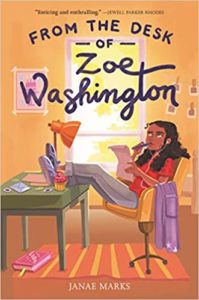
On her twelfth birthday, Zoe Washington discovers a letter from her incarcerated father, Marcus Johnson. Having never met him, Zoe’s curiosity leads her to write back, and their epistolary communication ensues. Through research of her own, Zoe learns about her father’s crime; when she asks him about it, he explains that he was at a tag sale that day. Convinced of her father’s innocence, Zoe decides to track down Marcus’ alibi witness with the help of her best friend Trevor. After several disappointments and a risky trip to Harvard University, Zoe finds the witness, only to be stalled again by the judicial system.
The Poet X
Elizabeth Acevedo
 Xiomara Batista is the daughter of a deeply Catholic mother who is convinced that her daughter’s womanly curves will lead her to a life of sin. School is not much easier where her male classmates view her body as an invitation. Forced further inward, Xiomara writes, filling the pages of her notebook. As she struggles to understand her own dreams and desires, an invitation to the school’s poetry slam awakens her. Suddenly, X has a lot to say, and she does so eloquently. The rich language of this verse novel accentuates Xiomara’s journey to self-identify despite religious and social perceptions.
Xiomara Batista is the daughter of a deeply Catholic mother who is convinced that her daughter’s womanly curves will lead her to a life of sin. School is not much easier where her male classmates view her body as an invitation. Forced further inward, Xiomara writes, filling the pages of her notebook. As she struggles to understand her own dreams and desires, an invitation to the school’s poetry slam awakens her. Suddenly, X has a lot to say, and she does so eloquently. The rich language of this verse novel accentuates Xiomara’s journey to self-identify despite religious and social perceptions.
Hacking Questions
Connie Hamilton
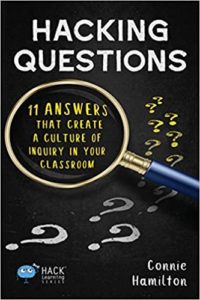 Learning is social, and there is perhaps no better way to engage students in the social aspects of learning than through productive discussions. In fact, Applebee et al. (2003) found a direct correlation between discussion and deeper understanding of content in middle and high school students. Hamilton’s book provides educators with eleven “hacks.” These hacks detail instructional moves that make classroom discussions engaging and student-centered. With intriguing chapter titles such as “Be a Pinball Wizard,” each hack includes “A Blueprint for Full Implementation” along with examples of its authentic use in a classroom.
Learning is social, and there is perhaps no better way to engage students in the social aspects of learning than through productive discussions. In fact, Applebee et al. (2003) found a direct correlation between discussion and deeper understanding of content in middle and high school students. Hamilton’s book provides educators with eleven “hacks.” These hacks detail instructional moves that make classroom discussions engaging and student-centered. With intriguing chapter titles such as “Be a Pinball Wizard,” each hack includes “A Blueprint for Full Implementation” along with examples of its authentic use in a classroom.
Learning to Improve
Bryk, Gomez, Grunow, & LeMahieu
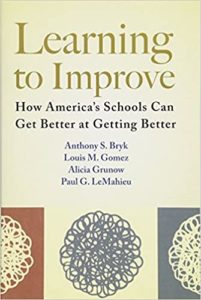 Bryk and colleagues look to successful examples of improvement science to illustrate what those involved in educational reform often overlook: the solutions need to be user-centered, and reformers need to not only understand the problem but the systems that contribute to it. To improve, these authors suggest careful analysis of the issue with “a diverse community” of experts at the table. Once change has been initiated, it is critical to collect and assess data in order to determine what is working and what is not. Finally, it is important to remember that implementing change requires constant “revision and fine tuning.”
Bryk and colleagues look to successful examples of improvement science to illustrate what those involved in educational reform often overlook: the solutions need to be user-centered, and reformers need to not only understand the problem but the systems that contribute to it. To improve, these authors suggest careful analysis of the issue with “a diverse community” of experts at the table. Once change has been initiated, it is critical to collect and assess data in order to determine what is working and what is not. Finally, it is important to remember that implementing change requires constant “revision and fine tuning.”
Cultivating a Culture of Anti-Bias and Anti-Racist Education
On May 25, George Floyd died a tragic and unnecessary death at the hands of a Minneapolis police office. While police brutality is unfortunately not a new issue, the outrage and injustice of this act has inspired protests throughout the country and world. In an article about Mr. Floyd in The Economist, the author stated, “His legacy is the rich promise of social reform.” As we work to slowly recover from the many effects of the COVID-19 pandemic, social reform that encompasses anti-bias and anti-racist education should be in the forefront of our thoughts. Drs. Nell K. Duke (University of Michigan) and Ernest Morrell (University of Notre Dame) recently wrote a commentary entitled “The Knee on the Neck of Children and Youth of Color in Schools.” In this short piece, they explain, “In our field—literacy education—a central concern are the texts that children and youth have the opportunity to read. Children and youth of color have far fewer opportunities in school to read texts with and about people who look like them or that are written by people who share their cultural background and experiences.” Some of those opportunities have been even further reduced by imposed remote learning due to COVID-19. Thankfully, multitudes of resources have been shared and posted for educators. The following are just a few, but they will help us to begin to foster an anti-bias and anti-racist environment in our classrooms.
Resources for Anti-Bias and Anti-Racism Education Compiled by SupportEd: This padlet provides extensive reading lists and educational and family resources; it also includes several articles on white privilege and how to become an ally.
Disproportionality, Bias, & Racial Equity in Pre-K Expulsions: Conducted in an interview format, Megan Pamela Ruth Madison addresses bias, racial disparities, issues of racial justice and the positive impact of teacher diversity.
Critical Practices for Anti-Bias Education from Teaching Tolerance: Teaching Tolerance provides educators with a guide that includes instructional practices, ways to cultivate a positive classroom culture, and suggestions for community and family engagement.
“Never Too Early to Learn: Anti-Bias Education for Young Children”: In this article, Hooven et al. articulate the National Association for the Education of Young Children’s anti-bias educational framework by focusing on four essential goals centered on children’s identity, language, behavior, and actions.
Social Justice Standards: The Teaching Tolerance Anti-Bias Framework: By focusing on identity, justice, diversity and action, these grade-level standards present educators with learning targets and anti-bias scenarios to guide students in adopting “anti-bias attitudes and behaviors.”
Drs. Duke and Morrell close their commentary with a final plea: “We call on all educators in the U.S. to take educational equity as a driving force in their practice […] Educators: be the change you want to see in the world.”
Noteworthy News
Employing a variety of creative alternatives, Wayne County teachers and staff honor their students’ milestones and continue to share heartfelt messages.
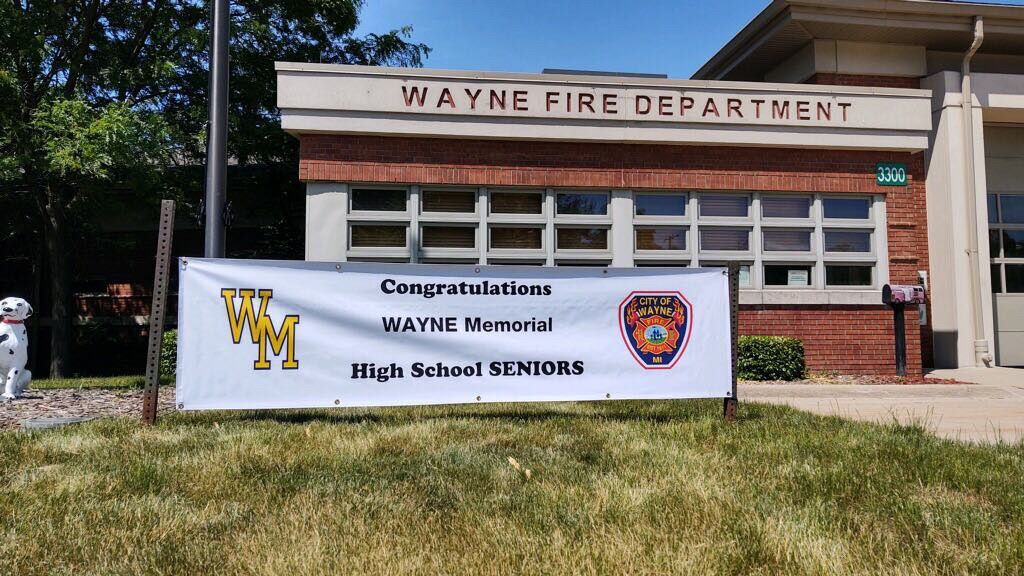

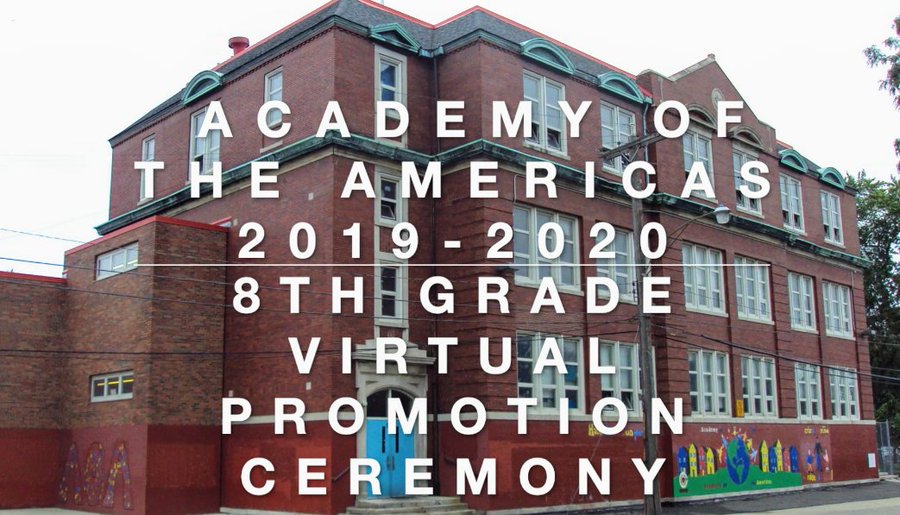

Professional Learning
| Upcoming Events at Wayne RESA |
| See the Professional Growth pages on the Wayne RESA site for links to course offerings, their descriptions, and online registration. All professional learning sessions will be provided virtually until September 30, 2020. At that time, Wayne RESA will reevaluate delivery platforms that ensure the health and safety of our presenters and participants. |
| Early Literacy |
| Prekindergarten Essential Instructional Practices in Early Literacy: See Cohort Registration and Start Dates Below |
Prekindergarten educators will participate in eight half-day sessions of intense training focused on the MAISA-GELN Essential Instructional Practices in Early Literacy, Prekindergarten. To support Michigan Department of Education’s mission to improve literacy learning equitably across the state, participants will closely examine the ten essential instructional practices that research has shown to be necessary for all Michigan prekindergarten children to demonstrate adequate progress toward literacy. For additional information, contact Debbie Reeves.
|
| Elementary |
| Content Area Literacy in K-5: Researcher’s Workshop Across the Curriculum: April 27 |
| Are you searching for a way to effectively immerse students in the richness and intrigue of content area learning while at the same time supporting their on-going literacy development? Join Stephanie Harvey, world-renowned literacy specialist and best-selling author, for an inspiring day exploring researcher’s workshop—a powerful and authentic instructional approach which adapts the familiar structures of reader’s and writer’s workshop to support students’ engagement and independence as learners. Throughout this workshop, Harvey will address the six cornerstones which foster thoughtful learning, including curiosity, workshop, content, comprehension, collaboration, and environment, which together provide a strong foundation for inquiry at every grade level across the curriculum. Participants will learn how to use researcher’s workshop to create irresistible investigations in science, social studies, and language arts; increase students’ independence and agency by gradually releasing responsibility for inquiry; and effectively integrate literacy and content through strategies for comprehension and critical thinking. All participants will receive a copy of Harvey’s recently released book (coauthored with Anne Goudvis and Brad Buhrow), Inquiry Illuminated: Researcher’s Workshop Across the Curriculum. The intended audience for this workshop includes K-5 classroom teachers, reading specialists, literacy coaches, elementary resource room teachers, and members of the leadership team. For additional information, contact Debbie Reeves. |
| Jan Richardson: Teaching Reading in Small Groups: March 4 |
| Join Jan Richardson as she brings her years of experience as a reading specialist, Reading Recovery teacher leader, best-selling author, and national literacy consultant to share best practices in providing small group reading instruction, a critical component of a balanced literacy program. Dr. Richardson will demonstrate how to use student assessment data to plan targeted instruction to meet individual needs. Participants will leave with a wealth of strategies to refine and energize their instructional delivery using precise assessment tools, detailed lesson plans, targeted reading strategies, and guided writing support. Workshop participants will receive Dr. Richardson’s popular professional book, The Next Step Forward in Guided Reading. The audience for this workshop includes K-3 classroom teachers, reading specialists, literacy coaches, elementary resource room teachers, and members of the leadership team. For additional information, contact Debbie Reeves. |
| Leveled Literacy Intervention, K-2: December 1 – 2 and March 9 OR February 1 – 2 and April 14 |
| The Fountas and Pinnell Leveled Literacy Program System (LLI) is a scientifically-based early intervention program designed to prevent literacy difficulties before they turn into long-term challenges. Participants will learn effective small group instructional strategies to provide the intensive support necessary for some primary students to achieve grade level competency in reading and writing. This program also specifically supports the unique needs of English Language Learners. This three-day workshop series will be led by Heinemann Literacy Consultant Dale Severyn, who will share her expertise as a reading specialist and certified Reading Recovery teacher leader. Enrollment in this series is limited to 30 participants, so early registration is recommended. Participants must bring to each session an orange, green, or blue LLI grade level kit (not included in this series). The target audience for this workshop is K-2 Teachers and Literacy Interventionists. For additional information, contact Debbie Reeves. |
| Leveled Literacy Intervention, Grades 3 – 5: December 8 – 9 and March 10 |
| The Fountas and Pinnell Leveled Literacy Program System (LLI) is a scientifically-based early intervention program designed to prevent literacy difficulties before they turn into long-term challenges. Participants will learn effective small group instructional strategies to provide the intensive support necessary for some intermediate students to achieve grade level competency in reading and writing. This program also specifically supports the unique needs of English Language Learners. This three-day workshop series will be led by Heinemann Literacy Consultant Dale Severyn, who will share her expertise as a reading specialist and certified Reading Recovery teacher leader. Enrollment in this series is limited to 30 participants, so early registration is recommended. Participants must bring to each session a red, gold, or purple LLI grade level kit (not included in this series). The intended audience for this series is grades 3-5 teachers and Literacy Interventionists. For additional information, contact Debbie Reeves. |
| Lisa Cleaveland: Writing Right From the Start: December 1 |
| Join author, national literacy consultant and master primary classroom teacher Lisa Cleaveland to learn best practice in writing instruction. During this foundational workshop, participants will learn the basic tenets of what it means to be a writer, effective classroom structures that support engagement in authentic, sustained writing, and a “gradual release” instructional model that scaffolds primary writers’ growth toward independence. Ms. Cleaveland also will discuss how young children can learn so much about writing from other authors they encounter during read aloud experiences. In addition, Cleaveland will share tips for problem-solving the common roadblocks and challenges that all primary teachers face in writing instruction. Workshop participants will receive Ms. Cleaveland’s popular professional book, coauthored with Katie Wood Ray, A Teacher’s Guide to Getting Started with Beginning Writers, Grades K-2 . The audience for this workshop includes K-2 classroom teachers, teachers of striving third grade writers, reading specialists, literacy coaches, elementary resource room teachers, and members of the leadership team. For additional information, contact Debbie Reeves. |
| Overview of the K-5 GELN Literacy Essentials: October 19 |
| Have you heard the phrase “minimum standard of care?” Are you familiar with how this phrase connects with literacy practices in our K-5 classrooms? If you are curious about these questions and how it can impact your teaching, then this session is for you! Come and learn about the GELN Essential Practices in literacy. In this session, participants will be provided an overview to the K-3 and 4-5 Literacy Essential Practices. Participants will spend time learning about motivation and engagement and the critical role these plays in all aspects of literacy development as well as the other 9 essentials. As each of the 10 essentials is introduced, participants will be given time for reflection and action planning; therefore, school literacy teams and/or grade level teams are encouraged to enroll together. This session could serve as a springboard to build ideas for professional learning linked to school improvement. All participants will receive their own printed copy of the GELN Literacy Essentials for Grades K-3 & 4-5. The intended audience for this session is K-5 teachers, reading specialists, literacy coaches, leadership team members, resource room teachers and grade level/school teams. (This session will focus on K-3 and 4-5 Essential Literacy Practices #1-10.) For additional information, contact Bridget Regan. |
| Pathways to 3rd Grade Reading Proficiency: November 10, December 1, February 24, March 4, March 25, and April 20 |
| In this professional learning series, participants will dive into Michigan’s Essential Instructional Practices in Early Literacy, Grades K to 3 (MAISA-GELN Early Literacy Task Force, 2016; https://literacyessentials.org) as they study ten essential research-based practices to enhance their capacity to guide and support students’ development toward 3rd grade reading proficiency. Participants will explore key components of a balanced literacy program, including: strategies for developing engagement, stamina, and independence; creating a thriving writing community to support skill and agency in both reading and writing; building necessary foundational skills for automaticity in print processing; using assessment data to plan targeted small group instruction; using interactive read aloud to build background knowledge and expand vocabulary; and developing specific strategies for deep comprehension of increasingly complex text. National early literacy consultants featured in this series will include Lisa Cleaveland and Jan Richardson, who will share research-based instructional strategies for accelerating K-3 students’ growth in literacy toward career and college readiness. Participants will also receive mentor texts and other resources to support literacy instruction. For additional information, contact Debbie Reeves. |
| Pathways to 3rd Grade Writing Proficiency: December 1, January 26, March 2, and April 15 |
| Are you looking for ways to strengthen your students’ engagement, skill, and independence as writers? In this foundational series, participants will explore effective classroom structures and strategies that support engagement in authentic, sustained writing. As they examine key components of the writing process and the architecture of a one-to-one conference, participants will refine their skill in noticing and naming writers’ strengths and challenges to determine next steps for instruction. Modeled and interactive writing strategies and the use of mentor texts will be highlighted as powerful models of what writers do and inspiration to build young children’s identities as writers themselves. Featured in this series will be national literacy consultant Lisa Cleaveland, coauthor with Katie Wood Ray of About the Authors and Classroom Essentials: A Teacher’s Guide to Getting Started with Beginning Writers. The intended audience for this course includes K-3 teachers, teachers of striving third grade writers, reading specialists, literacy coaches, and members of the leadership team. It is recommended that participants have previously attended a Pathways to K-5 Reading Proficiency series or the Essential Instructional Practices in Early Literacy roll-out through MAISA GELN. (This series will focus on K-3 Essential Literacy Practices #1, #2, #6, and #9.) For additional information, contact Debbie Reeves. |
| Storytelling with Digital Media: March 22 |
| Makerspaces encourage teachers to develop interactive opportunities for students as they develop products for a wide range of purposes and audiences. In this workshop, participants will discover ways to inspire active storytellers through digital media that tap into multiple literacies to create meaning. Participants will explore green screens and stop animation, e-book creations, and more. All participants will receive a stop animation starter kit and The Green Screen Maker Space Project Book. The intended audience for this course is K-12 educators. For additional information, contact Laura Gabrion. |
| Secondary |
| Creating Context for Teaching Night: May 10 |
| In collaboration with the Holocaust Museum, Wayne RESA proudly presents Creating Context for Teaching Night by Elie Wiesel. Participants in this course will explore the following learning outcomes: learn how to prepare students to read and understand Night within the larger historical framework of the Holocaust, examine the history of antisemitism to provide context before students read Night, examine Jewish life in Eastern Europe to provide cultural context for Night, explore the use of multimedia assets including using visual history testimonies and other primary sources and materials to support the effective teaching of Night, and discuss and identify themes, life lessons and the current relevance of Night. For additional information, contact Rosalyn Shahid. |
| Culturally Responsive Instruction: Teaching Critical Literacy & Hard History: October 26, November 9, November 23, and December 7 |
| In this four (4) day workshop, participants will gain an in-depth understanding of culturally responsive instruction and how to develop equitable classroom spaces that empower ALL students as learners and emerging citizens. This workshop will help teachers develop an equity lens by discovering and examining their own cultural identity in service of becoming culturally responsive instructors. Using Gholdy Muhammad’s Equity Framework, participants will develop their capacity to understand, develop, and implement culturally responsive lessons that cultivate the genius of ALL students. Culturally Responsive Instruction pursues four goals instructionally by helping students develop their identity, skills, intellect, and criticality. As students engage in culturally responsive instruction, they should demonstrate how that instruction helps them to: 1) Learn something about themselves and/or about others (Identity). 2) Build their skills for the content area they are studying (Skill). 3) Build their knowledge and mental powers (Intellect). 4) Engage their thinking about power and equity and the disruption of oppression (Criticality). Using the content areas of Literacy and Social Studies, teachers will be able to understand and utilize a culturally responsive instructional framework that can be applied to any content area. This workshop will be followed by seminar/practicum cohort Culturally Responsive Instruction (Level 2) which will explore implementation of CRI classroom strategies and practices in the classroom setting. For additional information, contact Virginia Winters. |
| Disciplinary Literacy in Action: November 17, December 9, January 14, and March 18 |
| In this hybrid course, participants will consider how to leverage the specialized aspects of their disciplines to help students learn best. ReLeah Lent, author of Disciplinary Literacy in Action, will share her insights on how to create and maximize units of study “that preserve discipline-specific content yet keep innovative daily practices of reading, writing, thinking, and doing at the forefront.” This course will focus heavily on the “doing” aspect of disciplinary literacy. Through a network approach, participants will unpack Michigan’s newly adopted Essential Practices for Disciplinary Literacy Instruction in the Secondary Classroom: Grades 6 to 12 and uncover what it means to put these practices into action. Educators will take a deep dive into problem-based pedagogy that draws heavily on community networking, business models, and academic conversations. The intended audience for this course is school-based interdisciplinary teams, instructional coaches servicing secondary schools, content area teachers, and anyone who is interested in exploring how to teach middle and high school students more authentically. For additional information, contact Rosalyn Shahid. |
| Instructional Shifts for 8th Grade PSAT 8/9: October 21 OR February 4 |
| This session will review key information for preparing and administering the 8/9 PSAT which replaces the MSTEP for 8th grade Math and English Languages Arts (ELA). We will explore crucial content features for both Math and ELA. Topics include: why the shift; PSAT 8/9 Test Blueprint; test dates and general information; special education accommodations and English language learner supports; test items analysis; ELA instructional shifts; and Math instructional shifts. For additional information, contact Cherron Ramsey. |
| Secondary Literacy Leaders’ Network: October 8, December 10, February 11, and April 15 |
| In alignment with Michigan’s Action Plan for Literacy Excellence, Wayne RESA has developed a consortium dedicated to the needs of secondary literacy professionals and the students they serve. This professional network will meet quarterly to discuss hot topics in adolescent literacy, legislative updates, and engage in professional learning. Ultimately, the purpose of this group is to draw on the collective wisdom of secondary educators and identify ways to improve secondary literacy instruction throughout Wayne County. The intended audience for this network is instructional coaches serving secondary schools, curriculum coordinators, and language arts instructors serving as lead teachers. For additional information, contact Rosalyn Shahid. |
| Teaching Anne Frank in the ELA Classroom: Context, Choice, and Meaningful Action: April 14 |
| In collaboration with the Holocaust Museum, Wayne RESA proudly presents Teaching Anne Frank in the ELA Classroom: Context, Choice, and Meaningful Action. Participants in this course will explore the following learning outcomes: Understand the historical context within which Anne Frank and her family were living, develop a rationale for teaching Anne Frank, use resources and strategies to meet the unique challenges that arise when teaching Anne Frank that can be used to effectively and responsibly teach about the Holocaust, think critically about complex issues and ideas, understand the importance of choice and responsibility, and learn about different ways of taking meaningful and informed action. The intended audience for this course is language arts and social studies teachers. For additional information, contact Rosalyn Shahid. |
| Coaching |
| Building Coaching Strategies: Entering Into the Conversation: September 16 – 17 and October 6 |
| In this learning series, coaches will explore their current beliefs and how those beliefs might facilitate or debilitate the relationship with a teacher. This training will provide the coaches with knowledge, skills, and dispositions to shift teachers’ thinking from responding, “This is how we have always done it” to considering new possibilities. Coaches will acquire a vast knowledge of effective coaching skills to mediate the thinking of the teachers they coach. This will enable the teachers to think deeply about their practice and to monitor and adjust as necessary. Coaches will understand the link between effective coaching and the transformation of teacher practice. The intended audience is instructional coaches and literacy specialists, though it is appropriate for anyone in an instructional coaching role. For additional information, contact Laura Gabrion. |
| Continuing the Conversation: Sustaining Coaching Skills and Dispositions: November 2 |
| This workshop is a follow-up to the Building Coaching Strategies: Entering into the Conversation series. In this course, participants will explore their adaptations to coaching by considering the implementation of new skills and dispositions, the challenges of working with adult learners, and the value of coaching. Using scenarios to prompt deeper analysis, participants will determine which additional supports might be needed in order to further strengthen their coaching abilities. The intended audience is instructional coaches and literacy specialists, though it is appropriate for anyone in an instructional coaching role. For additional information, contact Laura Gabrion. |
| COSA (Coaches on Special Assignment) Collaborative: September 15, November 17, January 12, and March 16 |
| This collaborative, which is funded through the MDE Coaching Grant and hosted by Wayne RESA, is a review and continuation of the foundational learning that coaches experience during Wayne RESA 3-Day COSA Academy. Its purpose is to provide a space for the COSAs to participate in deep-learning and dialogue about a coach’s role and responsibilities. Opportunities will be offered to unpack and practice the Essential Coaching Practices for Elementary Literacy as well as the Essential Instructional Practices in Elementary Literacy, Grades K-3. The collaborative is operating in conjunction with the Wayne County Coaching Network. Coaches on Special Assignment (COSA) are required to attend both series. For additional information, contact Mary-Lu Strimbel. |
| Wayne County Coaching Network: October 6, December 8, February 9, April 13, and May 11 |
| This network is designed to offer opportunities for deep study of research-based practices using collaborative inquiry (Problems of Practice), common texts, and discussion of the Essential Coaching Practices for Elementary Literacy. Building and sustaining relationships between both teacher-coach and principal-coach roles, developing assessment literacy knowledge and skills, and promoting equity through coaching will be unpacked. Forums led by district coaches and WRESA consultants will provide additional focused learning. The final session of the series will be a celebration of our growth. The intended audience for this course is new or experienced literacy coaches. For additional information, contact Mary-Lu Strimbel. |
| Wayne RESA 3-day COSA Academy: July 27 – July 30 |
| This Academy is designed for district COSAs (Coach on Special Assignment) in preparation for 2020-2021 implementation as part of the Wayne County Coaching Collaborative and funded through the MDE Coaching Grant in partnership with WRESA. The COSA Academy provides the opportunity for deep study and application of research-based MAISA GELN Essential Coaching Practices for Elementary Literacy. For additional information, contact Mellissa Wilson. |
| District Leadership |
| Essential School-Wide Practices in Literacy for Leaders: September 26 & October 24, September 28 & November 24, OR February 11 – 12 |
| This workshop examines how literacy leaders can use their megaphone to advocate and implement organizational practices that create equitable literacy learning for all. This 2-day series will help district literacy leadership teams and building leaders strengthen the organizational practices necessary to ensure that equitable literacy practices are maintained system-wide. The MAISA GELN Essential School-Wide and Center-Wide Practices in Literacy will serve as the guiding document, and the series will include training on effective application of the School-Wide Screener as a driver for systematic change. By the end of the series, participants will have thoughtful, specific, and informed plans for improving literacy instructional support in their schools and throughout the community to reach EVERY child! The audience for this workshop includes individuals and building/district literacy leadership teams committed to the implementation of evidence-based, high quality literacy learning across the learning environment. For additional information, contact Michelle Wagner. |
| Essential School-Wide Practices in Literacy for Leaders (Half-Day Option): September 29, October 13, November 4, and December 10 |
| This workshop examines how literacy leaders can use their megaphone to advocate and implement organizational practices that create equitable literacy learning for all. This 4-day series will help district literacy leadership teams and building leaders strengthen the organizational practices necessary to ensure that equitable literacy practices are maintained system-wide. The MAISA GELN Essential School-Wide and Center-Wide Practices in Literacy will serve as the guiding document, and the series will include training on effective application of the School-Wide Screener as a driver for systematic change. By the end of the series, participants will have thoughtful, specific, and informed plans for improving literacy instructional support in their schools and throughout the community to reach EVERY child! The audience for this workshop includes individuals and building/district literacy leadership teams committed to the implementation of evidence-based, high quality literacy learning across the learning environment. For additional information, contact Mellissa Wilson. |

Resources: Where can I find...
One relatively easy way to deliver instruction and/or feedback is to create a short screencast. Screencastify is a free Chrome extension that allows users to record screencasts and store them in Google Drive. Sharing the screencasts via link also eliminates problems with uploading large video files.
Looking for ways to engage students with instructional content? Pear Deck is a Google Slides add-on that allows users to strategically (and easily) insert interactive slides into a presentation. Teachers can ask students questions or include audio, and students can respond both asynchronously and synchronously.
Wayne RESA Literacy Team
Meet Laura Gabrion
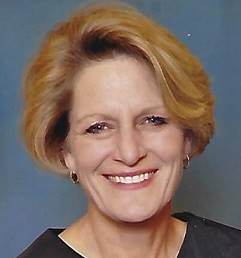
Laura Gabrion is a Literacy Consultant at Wayne RESA. Over the course of her career, Laura has taught at the middle school and college levels; she has also served as the Director of Professional Development for the Meadow Brook Writing Project and as a member of the Editorial Review Board of the Michigan Reading Journal. Laura has a Bachelor of Arts degree from the University of Michigan, a Master of Arts degree from DePaul University, and a Doctor of Philosophy degree from Oakland University. She believes that self- and collective efficacy are critical inroads to motivation, engagement, perseverance and performance in learners of all levels.
We look forward to hearing from you!
Laura Gabrion
Debbie Reeves
Bridget Regan
Rosalyn Shahid
Mary-Lu Strimbel
Mari Treece
Michelle Wagner
Colleen Whalen
Mellissa Wilson
If this newsletter has been forwarded to you, and you’d like to subscribe to it, please contact Laura Gabrion.
![]() 33500 Van Born Road • Wayne, MI 48184 • 734.334.1300 • 734.334.1620 fax • www.resa.net
33500 Van Born Road • Wayne, MI 48184 • 734.334.1300 • 734.334.1620 fax • www.resa.net
Board of Education
James S. Beri • Mary E. Blackmon • Danielle Funderburg • Lynda S. Jackson • James Petrie
Randy A. Liepa, Ph.D., Superintendent
“Use Your Megaphone”: Inspiring Excellence in Literacy Instruction Read More »